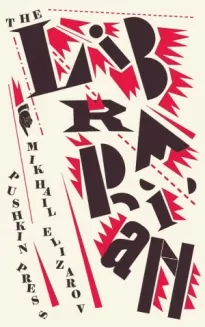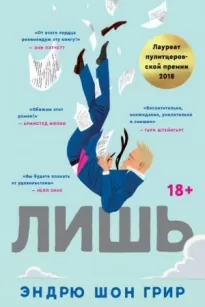The Librarian

- Автор: Михаил Елизаров
- Жанр: Современная проза / Социальная фантастика
- Дата выхода: 2015
Читать книгу "The Librarian"
LAGUDOV
VALERIAN MIKHAYLOVICH LAGUDOV could undoubtedly be considered one of the most influential figures in the universe of Gromovian discourse.
Lagudov was an only child, born to a family of teachers in Saratov. He demonstrated significant talent from early childhood. In 1945, as a youth of seventeen years, he set out for the war as a volunteer, but never reached the front—in April he contracted pneumonia and spent a month in hospital, and in May the war was over—the theme of a soldier who missed the war was an extremely painful one for Lagudov.
In 1947 Lagudov was admitted to the philological faculty of a university. After successfully defending his graduation thesis, he worked as a journalist on a provincial newspaper for twelve years, and in 1965 he was invited to join a literary journal, where he became the head of the review section.
Lagudov’s predecessor had departed from his post after letting a novel of dubious loyalty slip through. Khrushchev’s thaw had already taken place, but the boundaries of censorship remained blurred, and it wasn’t always easy to tell apart a text in the spirit of the new times and anti-Soviet propaganda. As a result both the journal and the publishing house had received a severe reprimand. And therefore Lagudov paid attention to everything that arrived on his desk. After glancing briefly through a story by Gromov one evening, he decided to polish the book off quickly and never come back to it. He had a positively warm review in mind—Lagudov’s conscience wouldn’t allow him to criticize a front-line veteran, even if the veteran’s politically correct text about anti-aircraft gunners was mediocre from an artistic point of view. Before nightfall he had finished the book. Without even suspecting it, the assiduous Lagudov had thus fulfilled the Condition of Continuity. Maintaining his vigilance, he had read the story from the first line to the last, without skipping the dreary paragraphs of nature description or any patriotic dialogue. And thus Lagudov had also fulfilled the Condition of Zeal.
He had read the Book of Joy, otherwise known as Narva. According to his former wife’s reminiscences, Lagudov experienced a state of turbulent euphoria and couldn’t sleep all night long; he said that he had subjected existence to a comprehensive analysis and had magnificent ideas about how to do good for mankind. He said that previously he had been enmeshed in life, but now everything had become clear, and he laughed loudly as he said it. By morning the emotions had subsided, and he drily informed his alarmed wife that it was too early to proclaim his ideas openly. That day he couldn’t go to work because he was in a depressed state, and he didn’t express any more ideas on the subject of universal harmony.
The substantive aspect of the euphoria that Lagudov experienced did not possess any conceptual points of intersection with Gromov’s storyline, and Lagudov himself did not link the events of the night with the book in any way. But nonetheless a certain emotional scar was left on his soul, which ensured that Lagudov did not forget the writer by the name of Gromov.
Eighteen years later Lagudov saw a short novel by Gromov in a seedy little shop at a railway station. Inspired by nostalgia for the happiness of that distant night, Lagudov bought the book; after all the reductions it cost only five copecks and it was not very large, about two hundred small pages—just right for the journey ahead.
In the suburban train circumstances once again assisted Lagudov in fulfilling the two Conditions. Some tipsy young louts travelling in his carriage were pestering the passengers. Lagudov, no longer young and not very strong, chose not to get involved with the burly yobs. As a man he felt ashamed of not being able to pull the villains up short, and so he stuck his nose into the book’s pages, pretending to be someone extremely interested in what he was reading.
The volume Lagudov had picked up this time was the Book of Memory (The Quiet Grass), which cast him briefly into a drowsy state. The book implanted in him a phantom of brilliant radiance, a mythical, non-existent memory. Lagudov was engulfed by such overwhelming tenderness for the life he dreamed of that he trembled in tearful ecstasy at this all-consuming, pure, lambent feeling.
Reading a second Book by Gromov wrought an abrupt change in Lagudov’s destiny. He left his job, divorced his wife and disappeared, leaving no tracks behind him. Three years later Lagudov surfaced again, and a mighty clan had already assembled around him, although its members called themselves a “library”. This was the term that came in time to be applied to all organizations of a similar nature.
In the first instance Lagudov’s library was joined by people on whom he had tested the Book of Memory. Initially he rather arrogantly took the miraculous effect to be the result of his own personal qualities. However, experiments showed that if the Conditions were observed, the Book affected everyone without exception. The psychiatrist Artur Friesman became Lagudov’s closest associate, although for the first few months Lagudov had doubted his mental health.
Lagudov was cautiously selective, recruiting members of peaceable professions that had been reduced to poverty—teachers, engineers, modest workers in the cultural sphere—those who had been intimidated and morally crushed by the sweeping changes of recent times. He assumed that the intelligentsia, humiliated by these new times, would provide amenable and reliable material, incapable of rebellion or betrayal, especially if the Books—and, by inference, Lagudov—could help realize the intelligentsia’s eternal yearning, as a class, for spirituality.
In many respects this supposition was mistaken. Gromov’s Books induced global personality change, and the circumspect Lagudov was merely fortunate with most of his new comrades, in addition to which he received professional assistance from Friesman, who by no means recruited anyone and everyone.
Those who joined the library usually felt profound respect and loyalty to Lagudov, and that was understandable—Valerian Mikhaylovich gave back hope to most of these despairing people tormented by poverty, offering them a meaning for their existence and a close community united around a single idea.
For the first two years the people whom Lagudov gathered under his banner were mostly humiliated and insulted members of the intelligentsia, but then he decided that the library was clearly lacking in a more robust kind of strength. And at this point Friesman came to Lagudov’s rescue. Men who had been shattered by the war in Afghanistan often came to his clinic for help. Friesman worked on these men first, and then handed them over to Lagudov. In 1991 the library was augmented by retired soldiers who had no wish to betray their Soviet oath. The former officers transformed the intelligentsia members into a serious combat unit with strict discipline and a security service. The library could turn out up to a hundred fighting men at any time.
Naturally, the system of selection did fail sometimes. Thoughtless prattlers appeared, who blabbed about the Books at every opportunity. On several occasions the shoots of conspiracy broke through the surface of the ground. But the mischief-makers all suffered an identical tragic fate—they disappeared without trace.
There were also cases of Books being stolen. Lagudov was betrayed by a rank-and-file reader, a certain Yakimov. After being issued the Book of Memory from the reserves when his turn came round, Yakimov duped the curator and fled to parts unknown. Lagudov had enough books, and the library was not impoverished, but the precedent was abhorrent in itself and, in addition, the traitor had managed to make his escape.
Other readers took their lead from this successful crime. These ones were caught. To restore Lagudov’s shaken authority and to deter any future miscreants, the book thieves were quartered in front of the entire library.
Yakimov was discovered by chance a year after the daring robbery. He had taken refuge in Ufa. A punitive assault force was immediately dispatched there, its mission to eliminate the thief and return the Book. Lagudov’s soldiers were greatly surprised when they discovered that Yakimov had not wasted his time in Ufa and had organized a library of his own.
Lagudov’s small detachment took the courageous decision not to wait for reinforcements to arrive. They openly informed Yakimov about the showdown in the laconic “we’re coming to get you” style. Cold weapons were agreed on and a spot outside the city, as remote as possible, was chosen.
It’s worth noting that the readers of Yakimov’s library lived according to the principle “the dead know no shame”. No one won the victory that night. Both adversaries withdrew, exhausted by the sanguinary conflict.
Lagudov didn’t hazard another punitive expedition. He needed to protect the book depository against the enemy closer to home and not send detachments off to the back of beyond, getting faithful readers killed in order to satisfy his own ambitions. His library was in any case surrounded by numerous aggressive rivals.
For a long time Lagudov assumed that knowledge of Gromov was being spread by traitors from his own library. He believed too strongly in his own chosen status and couldn’t possibly imagine that anyone apart from him had proved capable of penetrating the secret of the Books independently. Lagudov regarded all those who founded their power on his discovery as second-rate individuals, corrupt thieves. Even subsequently, when he was forced to abandon his ideas of exclusivity, he only accepted contact on an equal basis—and even then grudgingly—with initial, natural librarians: those who had solved the mystery of the Books with their own brains, without any prompting.
However, the proportion of those who became familiar with Gromov through information leaks was actually rather large and many new clans were organized around fugitive readers, without any theft necessarily being involved—at the end of the Eighties it wasn’t all that difficult to get hold of the Book of Memory if you really wanted to. The most important role was not played by renegades or by rumours, but by the missionary activities of the first “apostles”, whose names have long since occupied their posthumous places in the pantheon of this cruel and secretive society. Some of them are worth mentioning.
Pyotr Vladimirovich Shepchikhin. He worked in a print shop and typeset the Book of Memory. After confusing the dust jackets, instead of the detective novel he had set his mind on, he took home Gromov. By pure chance he got stuck in the lift with the book for the entire night, and when he was freed by lift engineers early in the morning, he came out a different man. A sensitive individual, Shepchikhin immediately realized that the reason lay not in his own physiology, but in the mysterious Book. Shaken by the mystery, he left his job and set off to wander the country, becoming one of Gromov’s most fervent propagandists.
Shepchikhin was killed—in fact he was probably bumped off by neophytes whom he himself had once told about the Book. They did away with him after deciding that Shepchikhin’s propagandist activities were too dangerous to the hermetic isolation of the Gromov world.
Yulian Olegovich Doroshevich. He was undergoing compulsory treatment at an occupational detoxification centre, and in order to avoid being driven insane by the sober boredom, he read. All sorts of garbage had settled in the libraries of those semi-punitive institutions—books that were even slightly worthwhile didn’t linger there for long. But thanks to that detoxification centre Doroshevich discovered Gromov and the Book of Endurance (The Silver Channel). This Book brought any afflicted soul a feeling of great consolation and reconciliation with life. It was said to be of help in cases of physical pain, acting as a general anaesthetic. The Book apparently had no substantial effect on feelings other than grief, fear and pain, but simply froze them into a general indifference. Doroshevich’s own psychological make-up determined the selective nature of his missionary work. He revealed the Book only to those people who, in his view, were the unhappiest. Doroshevich’s life was broken off in circumstances that have never been clarified; it is not known who killed him—probably someone who regarded the sin of murder as far less important than his own suffering.
It is possible that history exaggerates the spiritual qualities of the wandering “apostles” and that in actual fact they, like all librarians, coveted personal ascendancy and also tried to establish book communities, but failed to complete their mission.
Their strange selflessness rather contradicted the specific nature of the mystery. Every new reader who was introduced to Gromov realized that there would not be enough Joy, Endurance or Memory for everybody and it was better to keep mum about the author. In an organized community it was easier to keep the Books safe and increase their number, and therefore those lone wandering pathfinders died out. A library chose its own new readers, more readily recruiting solitary individuals without families and with some kind of mental problem, and examining each candidate at length to make sure they were worthy of communing with the miracle, and would be able to guard and protect it, and even, if necessary, give their lives for it.
In short, Lagudov had plenty of competitors. Soon not only the Books, but also the bibliographies of Gromov disappeared from every public library that was even slightly significant. Even in Moscow’s “Leninka” someone removed all the information from the card index. Consequently, during computerization the data on the missing author were not entered anywhere and Gromov formally disappeared. Someone also made free with the books on the shelves. Without the card index it was only possible to guess at the true number of publications.
By the beginning of the Nineties collectors of Gromov had a list of six already tried-and-tested Books. They also had information about a seventh, which they called the Book of Meaning. It was believed that when it was discovered the true purpose of Gromov’s creations would be revealed. As yet, however, no one could boast of having found a copy of Meaning, and some sceptics asserted that no such book actually existed.
All the libraries regarded a full collection of the works as an immensely powerful spell that ought to produce some kind of global result.
Lagudov’s theoreticians spoke of a “godlike condition” that lasted for the same length of time as the action of any particular Book. No one knew what benefits could be derived from this condition, correctly assuming that the ideas which occurred to someone inside God’s skin would transcend the human level. The rank-and-file readers were informed that, on becoming God, Lagudov would immediately make provision for his comrades-in-arms.
There were discussions about the end of the world, “book poisoning” that threatened the reader with death, or how all the Books, read straight through, would raise the dead. But these were only hypotheses.
It was assumed that Gromov himself might have had a complete set of works, but when Lagudov started searching, Gromov had been dead for a long time. When he died his apartment had gone to strangers and they had cleared out all the junk in the first week.
Gromov’s only daughter, Olga Dmitriyevna, lived with her family in Ukraine. One of Lagudov’s men paid her a visit, posing as a journalist, and was dismayed to discover that she had given the two Books she possessed to a casual visitor who had introduced himself as a literary scholar who was studying her father’s work. Olga Dmitriyevna did not remember the titles of the books either. They seemed to have been the Book of Memory and the Book of Joy.
Of course, Lagudov found out who had got there before him, but that was not much help. He didn’t engage in armed conflict with the competitors involved. After all, no one had deceived him, they had simply been quicker off the mark, and he only had himself to blame. Lagudov drew the appropriate conclusions for the future and tripled his efforts.
Gromov had a brother, Veniamin, to whom he also sent his books, and Lagudov had a stroke of luck with this brother—in addition to the Book of Memory and the Book of Joy, which Lagudov already had, a rather rare and valuable copy of the Book of Endurance (The Silver Channel ) was discovered. Acting like morphine, this book held all who were afflicted with pain and suffering firmly cemented into the library…
The years of systematic work were not entirely wasted. Rumour had it that Lagudov’s depository contained eight Books of Joy, three Books of Endurance and no fewer than a dozen copies of the Book of Memory (The Quiet Grass), which had been published last and was better preserved than the others: there were as many as several hundred copies of it in the world. The Book of Memory was strategically useful; its use made it easy to recruit and retain readers who were susceptible to tender feelings.
Two Books of Memory and an apartment in the very centre of Saratov were exchanged for a dangerous Book of Fury (By Labour’s Roads), which was capable of arousing a state of battle trance in even the most timid of hearts.
The other Books still had to be searched for. Lagudov had high hopes for the country’s outlying regions and its Central Asian neighbours, where Gromov’s Books could theoretically have been preserved, because by the beginning of the Nineties all the Books lying “on the surface” in Central Russia, eastern Ukraine and Belorussia had been picked up by collectors from various libraries.
But when the search became harder, methods that were far from noble came into play. Violent raids on depositories became more and more common.
At about the same time the so-called copyists became active— readers who made copies of the Books to sell for their personal enrichment. The copyists claimed that the effect of a copy was no different from that of the printed original.
But a manuscript almost always contained errors of some kind, or some words that had been omitted, and therefore proved ineffective. Photocopies that should have excluded the possibility of error also had no effect. It was thought that the decisive factor was the printing, and certain Books were reprinted. Rumours concerning the quality of a reprint “fake” were contradictory. In any case it was universally asserted that a copy would never compare with an original.
Forgeries provoked numerous skirmishes, which led to the demise of more than one library that had gone astray. The copyists were outlaws; they were liquidated by their own people and others alike. But they were highly successful in one regard—quite a lot of copies appeared.
That was when the cases of vandalism began. Original Books were sold and exchanged with a page skilfully removed and replaced by any other that was made of similar paper. Naturally, the mutilated Book had no effect. Whereas formerly people had restricted themselves to a cursory glance through a Book, after these incidents they went through the pages, comparing the typeface and the quality of the paper.
There had never been any great trust between the libraries—no one wished to reinforce the power of a rival. Exchanges or sales were extremely rare, and any fraud sparked a bloody conflict.





